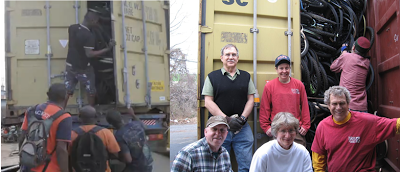 |
| Mechanic Agyen Emmanuel Courtesy BNB |
Ability Bikes Cooperative is a bicycle micro-enterprise in Koforidua that is owned and operated by physically challenged individuals, many afflicted by polio.
This full service repair and retail bicycle shop in the Eastern Region of Ghana imports used bikes and the staff of five mechanics, all with physical disabilities, refurbishes and sells the bikes to support the program.
 |
| John Sule Bukari Courtesy BNB |
I'm also very much impressed about the co-op because that one- one man, one vote. When we are in a meeting each and every one has his own vote."
John Sule Bukari, Mechanic.
 |
| Bike shipment Courtesy BNB |
"All of the members of Ability Bikes Cooperative are physically challenged, mostly from polio, and are “mobility challenged,” yet on a daily basis they run a business that provides a valuable service, increased mobility, to able-bodied people. Through these daily interactions with people in Koforidua, Ability Bikes members actively transform social perceptions of physically challenged people in society and redefine their role as highly valued," David Branigan.
 |
| Julius Amegavi Courtesy BNB |
"I know how to do everything about the bicycle. From the time I remove a bicycle from the stand and put it on the ground I know that bicycle is a complete bicycle. The person can move it to everywhere."
Julius Amegavi, Mechanic
Ability Bikes provides more than a full time job and skills training to its employees. Each employee shares a stake in the business. Every member is part owner and bears responsibility for the success of the shop. "Ability Bikes represents an important model for sustainable development that cultivates autonomy through capacity building and strategic technical support," David Branigan.
 |
| Agyen Emmanuel with Mirriam Oduro Courtesy BNB |
"I want my children to see me doing this work, that is my dream. I'm proud of myself because I am the only woman mechanic in Koforidua."
Mirriam Oduro.
Check out more photos of Ability Bikes, courtesy Bikes Not Bombs.






















